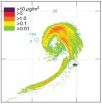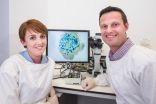(Press-News.org) Two new reports that focus on the global electricity water nexus have just been published. Three years of research show that by the year 2040 there will not be enough water in the world to quench the thirst of the world population and keep the current energy and power solutions going if we continue doing what we are doing today. It is a clash of competing necessities, between drinking water and energy demand. Behind the research is a group of researchers from Aarhus University in Denmark, Vermont Law School and CNA Corporation in the US.
In most countries, electricity is the biggest source of water consumption because the power plants need cooling cycles in order to function. The only energy systems that do not require cooling cycles are wind and solar systems, and therefore one of the primary recommendations issued by these researchers is to replace old power systems with more sustainable wind and solar systems.
The research has also yielded the surprising finding that most power systems do not even register how much water is being used to keep the systems going.
By 2020 the water issue affects 30-40% of the world
"It's a huge problem that the electricity sector do not even realise how much water they actually consume. And together with the fact that we do not have unlimited water resources, it could lead to a serious crisis if nobody acts on it soon", says Professor Benjamin Sovacool from Aarhus University.
Combining the new research results with projections about water shortage and the world population, it shows that by 2020 many areas of the world will no longer have access to clean drinking water. In fact, the results predict that by 2020 about 30-40% of the world will have water scarcity, and according to the researchers, climate change can make this even worse.
"This means that we'll have to decide where we spend our water in the future. Do we want to spend it on keeping the power plants going or as drinking water? We don't have enough water to do both", says Professor Benjamin Sovacool.
How to solve the problem?
In the reports, the researchers emphasise six general recommendations for decision-makers to follow in order to stop this development and handle the crisis around the world:
Improve energy efficiency
Better research on alternative cooling cycles
Registering how much water power plants use
Massive investments in wind energy
Massive investments in solar energy
Abandon fossil fuel facilities in all water stressed places (which means half the planet)
Close up on France, the US, China and India
The team of researchers conducted their research focusing on four different case studies in France, the United States, China and India respectively. Rather than reviewing the situation on a national level, the team narrowed in and focused on specific utilities and energy suppliers. The first step was identifying the current energy needs, and then the researchers made projections as far as 2040, and most of the results were surprising. All four case studies project that it will be impossible to continue to produce electricity in this way and meet the water demand by 2040.
"If we keep doing business as usual, we are facing an insurmountable water shortage – even if water was free, because it's not a matter of the price. There will no water by 2040 if we keep doing what we're doing today. There's no time to waste. We need to act now", concludes Professor Benjamin Sovacool.
INFORMATION:
More information
More information about the research and links to the reports: http://www.cna.org/ewc
Questions regarding the reports and invitations to participate in debates about related issues should be addressed to:
Benjamin Sovacool, Professor and Centre Director of Centre for Energy Technologies (CET)
Aarhus University, School of Business and Social Sciences, AU Herning, Denmark
E-mail: benjaminso@hih.au.dk
Phone: +45 8716 6915
Worldwide water shortage by 2040
2014-07-29
ELSE PRESS RELEASES FROM THIS DATE:
Mortality rates increase due to extreme heat and cold
2014-07-29
Epidemiological studies have repeatedly shown that death rates rise in association with extremely hot weather. The heat wave in Western Europe in the summer of 2003, for example, resulted in about 22,000 extra deaths. A team of researchers led by Dr. Alex-andra Schneider at the Institute of Epidemiology II at the Helmholtz Zentrum München examined the impact of extreme temperatures on the number of deaths caused by cardiovascular disease in three Bavarian cities and included both high and low temperatures in the study.
"Our findings confirm the results of our previous ...
A new brain-based marker of stress susceptibility
2014-07-29
DURHAM, N.C. -- Some people can handle stressful situations better than others, and it's not all in their genes: Even identical twins show differences in how they respond.
Researchers have identified a specific electrical pattern in the brains of genetically identical mice that predicts how well individual animals will fare in stressful situations.
The findings, published July 29 in Nature Communications, may eventually help researchers prevent potential consequences of chronic stress -- such as post-traumatic stress disorder, depression and other psychiatric disorders ...
First grade reading suffers in segregated schools
2014-07-29
A groundbreaking study from the Frank Porter Graham Child Development Institute (FPG) has found that African-American students in first grade experience smaller gains in reading when they attend segregated schools—but the students' backgrounds likely are not the cause of the differences.
According to the Center for Civil Rights, although the United States is becoming more racially and ethnically diverse, segregation is still on the rise. To better understand segregation's impact on student performance, FPG scientists looked at nearly 4000 first graders in public schools ...
Local education politics 'far from dead'
2014-07-29
EAST LANSING, Mich. --- Teach for America, known for recruiting teachers, is also setting its sights on capturing school board seats across the nation. Surprisingly, however, political candidates from the program aren't just pushing its national education agenda, they're advancing local issues as well, according to a new study.
The findings, said Michigan State University's Rebecca Jacobsen, refute the argument that school boards have become ineffective and obsolete in the wake of national education reform. Teach for America, a nonprofit that enlists high-achieving college ...
Wildfires continue near Yellowknife, Canada
2014-07-29
The wildfires that have been plaguing the Northern Territories in Canada and have sent smoke drifting down to the Great Lakes in the U.S. continue on. NASA's Aqua satellite collected this natural-color image with the Moderate Resolution Imaging Spectroradiometer, MODIS, instrument on July 26, 2014. Actively burning areas, detected by MODIS's thermal bands, are outlined in red. Copious amount of smoke are drifting northward in this image. Smoke is also creating havoc for residents of Yellowknife. Fire has caused power outages in the area and because of the smoke, line ...
Stem cell advance may increase efficiency of tissue regeneration
2014-07-29
A new stem-cell discovery might one day lead to a more streamlined process for obtaining stem cells, which in turn could be used in the development of replacement tissue for failing body parts, according to UC San Francisco scientists who reported the findings in the current edition of Cell.
The work builds on a strategy that involves reprogramming adult cells back to an embryonic state in which they again have the potential to become any type of cell.
The efficiency of this process may soon increase thanks to the scientists' identification of biochemical pathways ...
New research reveals Pele is powerful, even in the sky
2014-07-29
One might assume that a tropical storm moving through volcanic smog (vog) would sweep up the tainted air and march on, unchanged. However, a recent study from atmospheric scientists at the University of Hawai'i – Mānoa (UHM) revealed that, though microscopic, gasses and particles from Kilauea volcano exerted an influence on Tropical Storm Flossie – affecting the formation of thunderstorms and lightning in the sizeable storm.
In July 2013, as Flossie approached the Hawaiian Islands, satellites steadily monitored lightning, rainfall, cloud cover, temperature and ...
Herpes remains active even when no symptoms appear
2014-07-29
Scientists investigating the herpes virus have been surprised to find an ongoing conflict in the cells of sufferers, even when the virus is apparently dormant.
Herpes Simplex Type 1 is a virus that causes cold sores. It remains in the body's nervous system indefinitely after infection. Around 80 per cent of Australians carry the virus, although it is usually in a dormant state.
"We thought when the disease was dormant, it was a truce," said Associate Professor David Tscharke from The Australian National University Research School of Biology. "It turns out that the virus ...
How does microRNA-124 promote the neuronal differentiation of BMSCs?
2014-07-29
MicroRNAs (miRNAs) play an important regulatory role in the self-renewal and differentiation of stem cells. Dr. Defeng Zou and co-workers from the First Affiliated Hospital of China Medical University, China focuses on the effect of miRNA overexpression on the differentiation of bone marrow-derived mesenchymal stem cells into neurons. In the study released on the Neural Regeneration Research (Vol. 9, No. 12, 2014), researchers used GeneChip technology to analyze the expression of miRNAs in bone marrow-derived mesenchymal stem cells, neural stem cells and neurons. They constructed ...
Prolonged electrical stimulation causes no damage to sacral nerve roots in rabbits
2014-07-29
Previous studies have shown that, anode block electrical stimulation of the sacral nerve root can produce physiological urination and reconstruct urinary bladder function in rabbits. However, whether long-term anode block electrical stimulation causes damage to the sacral nerve root remains unclear, and needs further investigation. In a recent study reported on the Neural Regeneration Research (Vol. 9, No. 12, 2014), Dr. Peng Yan and co-workers from Jilin University, China established a complete spinal cord injury model in New Zealand white rabbits through T9-10 segment ...




